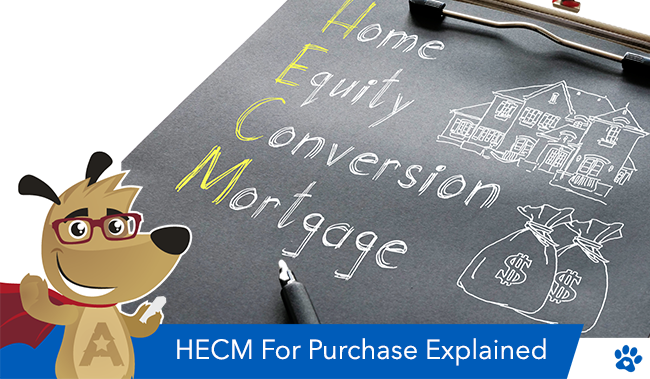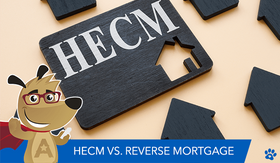What Is a HECM for Purchase? Explained With Examples
Updated March 19, 2025

In the world of real estate, you may (or may not) have come across the Home Equity Conversion Mortgage (HECM) for purchase. This unique loan product is tailor-made for those aged 62 and older and offers a certain amount of financial flexibility. Below, we delve into HECM's mechanics, eligibility, and estate implications, revealing its pros and cons. Expert insights will empower you to leverage HECM for Purchase, opening doors to a more comfortable retirement.
Meet the expert
Michael G. Branson, CEO of All Reverse Mortgage, Inc. and moderator of ARLO™, has 45 years of experience in the mortgage banking industry. He has devoted the past 20 years to reverse mortgages exclusively.
What is a HECM for purchase?
A Home Equity Conversion Mortgage (HECM) is a specialized type of reverse mortgage program designed to help senior homeowners aged 62 and older purchase a primary residence.
Because a HECM doesn't require a monthly payment, you can bring a down payment to the closing table and use the fully funded HECM to pay the seller. Then, you have no ongoing monthly payments (you are still responsible for your taxes, insurance, and any other property charges such as HOA dues, etc.). This helps you maintain a more flexible monthly income and yet live in a very nice home for your retirement years.
HECM conditions include:
- The minimum age requirement is 62 years old. In the case of a married couple, only one of the borrowers must be at least 62 years old.
- The HECM must be used on a property that's the primary residence.
- While not too stringent, the property must meet HUD minimum requirements
- Over time, at least one of the borrowers must remain in the property as their primary residence to keep the HECM in place.
Pros and Cons of HECMs
Pros
- Qualifying may be easier than for a conventional mortgage
- Monthly out-of-pocket payments for loan repayment are not required
- Borrowers can relocate with no monthly payments while not having to pay the entire purchase price in cash
Cons
- Equity in your primary residence may diminish over time.
- Since you use a full draw to purchase, no further draws may be taken on the loan later
- Fees and interest rates may be higher than with a conventional loan.
Difference between HECM for Purchase vs. other reverse mortgage types
HECM must be fully funded for the purchase. Your down payment and the fully funded HECM will pay the seller the entire sales price. Otherwise, payment requirements and structure for any HECM are the same.
Examples of HECMs for purchase
- You want to preserve your assets but still operate like you paid cash for the property.
- You want to upgrade to a property that would be unattainable based on the equity in your current property, and you cannot go into debt at this stage of your life to support the new, nicer residence.
- Your current home no longer meets your needs either because of its physical location or characteristics/limitations, but you cannot pay cash for a new home, and your budget will not support new house payments.
Basic Mechanics of HECM for purchase
The basics of any HECM are the same:
- Monthly payments are not required from the borrower.
- Interest payments will be added to the loan balance and paid in full when the property is sold.
An important feature of using a HECM for purchase is that you must bring a down payment larger (40-50%) than required for a conventional 30-year mortgage loan. As with any HECM, a strong equity position is necessary to satisfy the loan requirements, hence the large down payment. The amount of the down payment depends on the borrower’s age(s) and current interest rates.
Calculating loan proceeds in a HECM for purchase arrangement
Your down payment plus the fully-funded HECM must equal at least the purchase price for the seller. This includes factoring in the closing costs. The seller can contribute toward closing costs as negotiated in the sales contract. Alternatively, you can pay closing costs out of pocket or add it to the loan balance at closing. Regardless of the payment method, the seller must receive their full sales price at the close of escrow.
Top tip: Use a reverse mortgage purchase calculator to determine your required down payment and view current interest rates and amortization schedules.
HECM loan repayment and implications
Because you don't have to make monthly payments during the term of a HECM loan, interest is added to the loan's principal balance every month instead. Therefore, the loan balance grows over time. The entire loan balance is then due when you vacate the property. This can be because:
- You pass away.
- You move out of the property and no longer use it as your primary residence.
- You sell the property.
In the event of death, your heirs must sell the property and pay the entire outstanding balance in full; they can refinance the property and pay the mortgage off in full, or they can choose to walk away and owe nothing. If the total mortgage balance exceeds the fair market value sale of the property, there's no obligation to pay the difference. If your heirs wish to keep the home and the value is lower than the current appraised value, the lender will accept 95% of the current appraised value as payment in full, regardless of the higher loan amount.
Estate planning and inheritances with HECM for purchase
The major implication for your estate planning or heirs is that the equity in your primary residence will diminish over time. Because the interest due is added on top of the loan amount, the loan will grow and lessen the equity available.
It's important to understand that because there may be less equity in your home upon its sale, there could be less cash for a down payment on a new home, and your heirs may inherit less.
Unlocking financial opportunities through HECM for purchase
The HECM loan is an excellent tool for many reasons, including maintaining existing assets, reducing monthly outgo, paying for long-term health care, buying a second home, paying off debt, or even traveling.
As long as you understand how a HECM works and that the equity in your current primary residence will be diminished over time, it's an effective method to tap into the equity that has been growing over the years and doing so with no additional monthly outgo.
» Need more info? Reach out to a qualified reverse mortgage lender or try financial counseling





